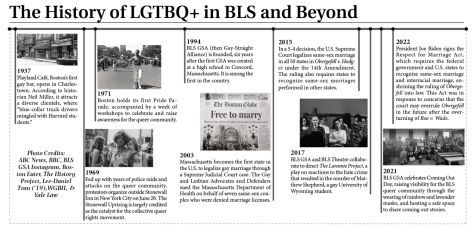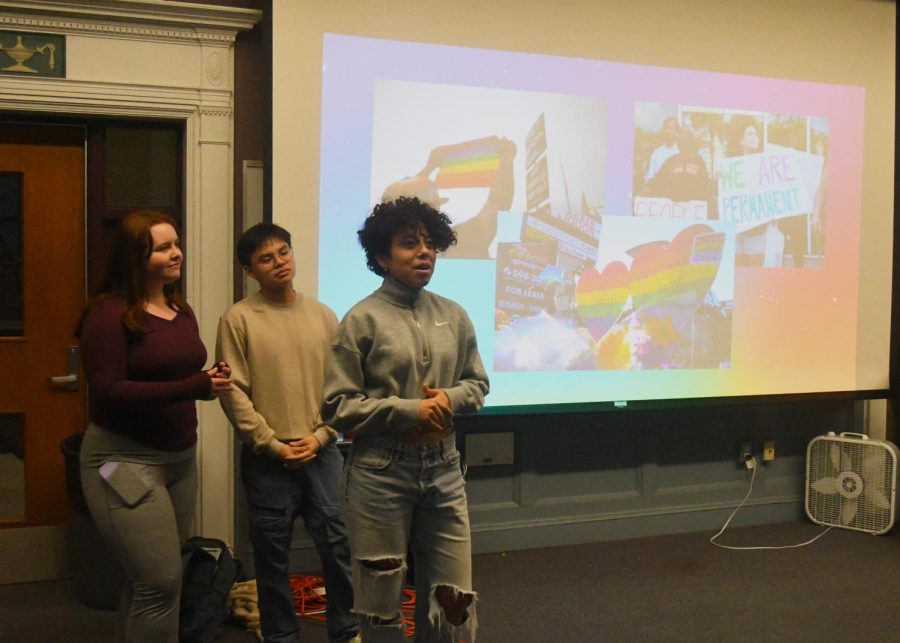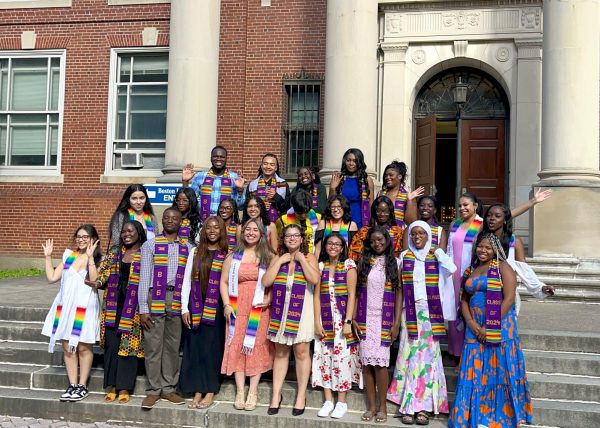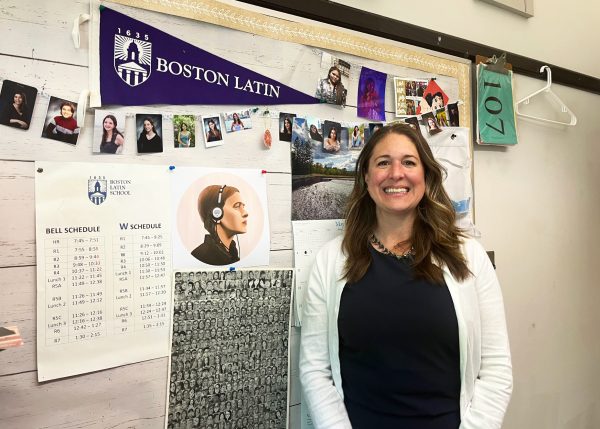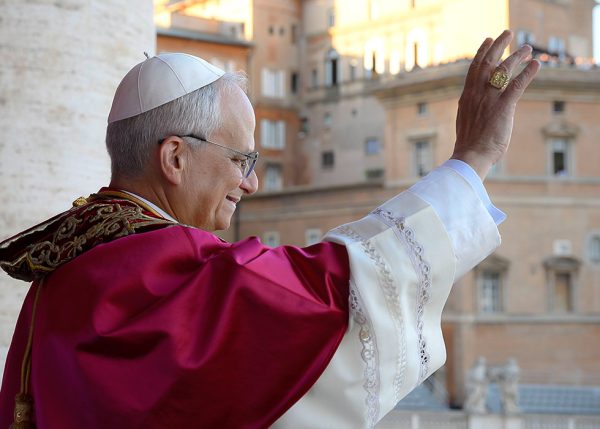Pride Prevails: LGBTQ+ Community at BLS
Amid the heightened negativity surrounding the LGBTQ+ community throughout the country, students are advocating for a more inclusive environment within Boston Latin School.
In December, the Topol Fellows for Peace and Nonviolence and BLS Gender Sexuality Alliance (GSA) united members of the LGBTQ+ community and its allies, creating a space for them to share their feelings thoughtfully.
Topol Fellow Ethan Nguyen (I) shares the Topols’ reasons for holding this discussion: “The Topol Fellows, in alliance with GSA, wanted to begin the conversation surrounding the recent rhetoric surrounding LGBTQ+ rights. […] We felt the initiative to shed light on the recent tragedies in the news. When we close our eyes to the violence that others face every day because it doesn’t pertain to us, we perpetuate the hate of the perpetrators. Many don’t realize the true power of just listening.”
During this event, the Topol Fellows presented a slideshow including statistics on recent hate crimes across the United States. Students attended to share and discuss their reactions and experiences as LGBTQ+ individuals and allies in Boston, with the use of “I” statements encouraged to avoid generalizations and to welcome different perspectives.
The rise in censorship and disruption regarding LGBTQ+ expression has left community members distraught. GSA club advisor Ms. Danielle Murray underscores the importance of representation: “It’s going to take a toll on you to realize that your very identity, your very being, is being debated miles away. You know, that’s a scary feeling. […] I want my son to be able to go into books and find in libraries and find books about his family.”
Ms. Murray says this in reference to the recent attacks on LGBTQ+ literature around Massachusetts. This past summer, a drag queen story hour took place at Jamaica Plain’s Loring Greenough House when neo-Nazis disrupted the meeting and taunted its participants. A few months later, books on LGBTQ+ youth were under controversy at Old Rochester Regional High School, located just 60 miles from BLS. These books, though they represented diverse queer youth, received backlash for simply being displayed on the shelves.
Still, Ms. Murray observes significant progress in increasing visibility for LGBTQ+ students throughout the time she has worked at BLS. She specifically appreciates the displays made in the library and the awareness celebrations at BLS, such as National Coming Out Day and Pride Month, created with significant efforts from GSA.
In addition, GSA’s newly-opened LGBTQ+ Study Space is tailored towards queer students who are looking to create friendships and complete work with the help of tutors and staff they relate to. It takes place in the Electronic Classroom on Wednesdays after school.
Emilia Saldaña (I), president of GSA, expresses, “When I was in middle school, […] I felt isolated because of who I was. And I hope that that’s changed for younger students. But I think having a space that was just a space for LGBTQ+ people every week where I could ask them questions, whether it was about homework or life. It would have been beneficial to me so I hope to provide that for younger students.”
While there has been significant support for the LGBTQ+ community among the student body and various extracurricular activities, members feel that the curriculum and administration could do more to extend their allyship.
“BLS does a good job at creating inclusivity for LGBTQ+ students. […] GSA and the Lesbian Empowerment Society only exemplify that. Curriculum-wise, however, I think it varies [from] class to class. Facing History and Ourselves does a good job at educating students on LGBTQ+ topics, but […] English and History classes simply do not address the topics much,” shares a student whose name is removed for privacy reasons.
This student adds that the first time they encountered LGBTQ+ representation in the school curriculum was in tenth grade, over halfway through a student’s typical six-year BLS career. They find this worrisome since younger students may miss the chance to learn about themselves or their peers.
In addition to the poor representation in the school curriculum, students assert that teachers are not doing enough to make their classrooms safe spaces.
Before this school year, faculty were provided with practices to implement in their classrooms to foster an open environment. Students report that teachers, however, did not uphold these new standards.
“Something seemingly small, but actually big, [is] pronouns and preferred names because I have friends who have different names they go by and then teachers won’t remember or just won’t try using them and it’s not good. It’s hurtful,” states Nandini Chilakapati (III).
She believes that a good way to showcase students’ pronouns is through a letter to the teacher, in which students can explicitly state which pronouns to use for them in class and with parents.
Saldaña also notes that some teachers choose not to display or have peeled off their “Safe Space” sticker, meant to indicate allyship, from their classroom doors.
She adds, “A small thing is just keeping those stickers and just helping students understand that every single classroom is supposed to be a safe space. […] Teachers who don’t need to face some sort of retribution or education to understand why that [is the case] isn’t acceptable.”
Although some LGBTQ+ community members feel comfortable expressing their sexuality and gender at BLS, everyone can agree that there remains a long path ahead. Nguyen explains that the entire community needs to work against prejudices faced by minority groups.
“The cycle of oppression must be broken, and that process begins with us. We need to remember that the way someone acts, what they choose to embrace, how they dress, how they speak, none of it determines who they are and who they love. That’s how we can begin fostering a more inclusive and welcoming community,” concludes Nguyen.
